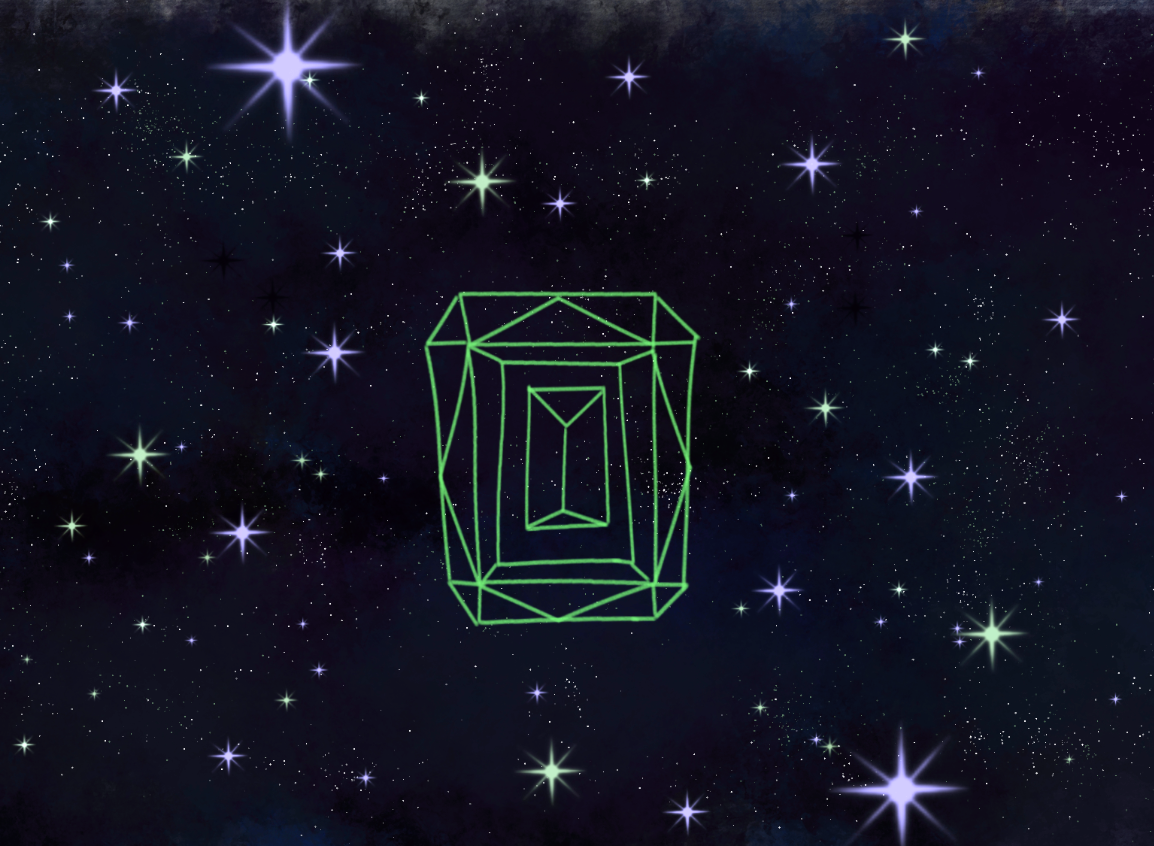Cosmic Curses. Existentialism. Wanderers. The call of the “pure, black void.” If any of these descriptions caught your eye, chances are that you’ll be interested in music created by Lord Huron, a Los-Angeles based band known for crafting albums with complex lore that encompass all of these concepts and more. The band was initially created by Ben Schneider, who independently created the first two EPs, and later on, Mark Berry, Miguel Briseño, and Tom Renaud, who play percussion, bass, and guitar respectively, joined. Over the years, they have created five albums, though most of their lore can be found in “Lonesome Dreams” (2012), “Strange Trails” (2015), “Vide Noir” (2018), and “Long Lost” (2021). Their most well known song, “The Night We Met,” is a part of the soundtrack of “Thirteen Reasons Why,” a Netflix series.
Out of all of these albums, “Vide Noir” stands out with its references to the cosmos and of course, the endless void. Unlike albums such as “Strange Trails,” it doesn’t quite call to mind rural western-movie soundtracks, and instead brings up concepts of individuality, longing, and helplessness. Part of Lord Huron’s unique charm is the intense philosophical introspection that goes into their lyrics, and this quality is emphasized heavily in this album.
The story of the album and its accompanying film chronicle, which recounts the journey of a young man on a quest to find someone in the city of Los Angeles. According to Schneider, he does end up finding this person at the end of the album, but they end up having some sort of fallout. By listening to the entirety of “Vide Noir,” I’ve managed to piece together my own theory of what happens throughout this story.
The opening title, “Lost in Time and Space,” chronicles the thoughts of the album’s protagonist. He expresses feelings of losing himself (likely through alcohol, as evidenced in the lyric, “lost in a galaxy of cocktail bars”). He feels this way because someone close to him recently took his money, moved west, and stopped contacting him. He decides to find her, quitting his job and recklessly driving to Los Angeles, in search of his love. Out of all the songs in the album, “Lost in Time and Space” incorporates more of the rural folkloric vibe that is more typical of Lord Huron. The vocals are somewhat distorted, bringing a somber quality to the song against the slightly muted instruments in the background. It’s almost unsettling, and it does a great job of setting the scene for the rest of the album.
The second song, “Never Ever”, mainly consists of his hopes of finding this mysterious figure, and implies that the two had an intimate relationship. The protagonist is determined to locate her no matter what happens. This song begins with a slow buildup which eventually explodes into a passionate chorus, and contains a darker undertone than the previous song on the album. If “Lost in Time and Space” set the scene, “Never Ever” introduces us to the stakes on the table for the protagonist.
The plot really begins to thicken in “Ancient Names Part I”, where he goes to see a fortune teller, who warns him that he cannot escape some sort of terrible fate, which I believe to either be death or not finding this potential lover. He attempts to evade this fortune teller, and expresses doubts he may not make it out of her domain alive. The song starts out almost wistful, and the utilization of harp music paired against the steady pounding of drums somehow adds to the desperation that rings out from the vocals.
Ancient Names Part II consists of the protagonist expressing a feeling akin resentment towards the girl who left him, with the lyrics “Gone baby gone we’ve all had enough/ carry on and spend all your dough/ take it down to the ground and sink me below,” as evidence. I believe it to be her specifically because of the mentions of her stealing his cash earlier. It also explores how helplessly infinitesimal he feels in the eye of the universe, and explains his denial of death and how he tries to prove his existence, lending to the idea that he is trying to escape it as his fate. In my opinion, this song absolutely stands out in this album. There’s no introduction or buildup; a few seconds after the song begins, you are immediately hit with Ben Schneider screaming lyrics, leaving behind a frustration and the sheer anger that nearly all of us have felt at our cosmic insignificance. The guitars and basslines that are ever prevalent throughout this song fade into the gentle strumming of a banjo, slowly dragging you away from the intensity of the music.
“Wait by the River” has a much more peaceful tone, and it is filled with longing for the missing girl. He expresses regret for his previous resentment and possibly arguments that happened before she moved away in “Baby, I didn’t mean the things I said/ I don’t honestly wish you were dead.” He mentions feeling as if he will die if he cannot find her. The song starts out peaceful, though a strange discordant harmony at the introduction makes you wonder if everything in this song is truly as it seems. It’s rather slow paced, and the vocals are melancholy, almost tinged with regret.
“Secret of Life has a greater contribution to the plot, as it gives us insight on why exactly the protagonist wants to find this individual. A person named the Ender is referenced, possibly alluding to the song “The World Ender” in another Lord Huron album, “Strange Trails”, which talks about a man who rose from the dead to enact vengeance on those who took his family. It begins with a mesmerizing, almost intriguing instrumental. The song carries a sort of urgency to it, though it isn’t quite as apparent as it was in songs like “Ancient Names Part 1.”
The protagonist was seemingly cursed by this girl to be chained to this undead man’s service. We also learn that the girl herself somehow cheated death and gained immortality, showing the protagonist how to become immortal himself. I personally think that this secret of life the girl showed our lead character involves some contract with the Ender, as he technically escaped death himself. For whatever reason, the protagonist has changed his mind about this deal, and may be looking for the girl so that she can end this contractual immortality as well as offer him some sort of love. I believe that he has accepted the probable fate of death given to him by the fortune teller. He also mentions leaving the earth, which makes me wonder if the lead also gained some supernatural power through his immortality, though I’m not sure.
“Back from the Edge” tells us that he did indeed somehow manage to fly or escape the confines of earth, but ended up falling towards it once more. He mentions that he didn’t die, adding to the theory that he is somehow immortal by unnatural means. The vocalizations and almost cinematic background of the song brings to mind similarities to the song “The Man Who Lives Forever” on the album “Lonesome Dreams.” Though this song is much darker in nature, it also somehow calls back to the innocent optimism of “The Man who Lives Forever.” It’s also rather slow paced, and at times, I felt like it was almost dragging on. This is further explored in “The Balancer’s Eye”, which talks about the narrator’s fear of death, and personifies it as the Balancer. He gives up on ending his curse and worries about the repercussions for seeking immortality. At the very end, we hear a woman’s voice telling the lead to follow the emerald star, which I believe to be a sign sent from the girl in order for him to find her. This song is one of my favorites in the album. Every lyric seems to be drenched in solemn dread and a more bitter sort of regret than we’ve seen before in “Vide Noir.”
“When the Night is Over” confirms that the protagonist was in love with this girl. He expresses hopelessness since he hasn’t been able to find her yet, and explains that he has a deadline to find her before the night is over. This likely has to do with his curse. Perhaps it can only be changed by that night. He also mentions an emerald in the sky, which is what the missing individual he’s been looking for may have sent him. Furthermore, it hints to Vide Noir’s album cover, which is a design of an emerald contrasted with the night sky. There’s an almost waltz-like quality to this song, and the interjection of “Am I lost inside my mind?/There’s an emerald in the sky” really gives you insight into how deeply the narrator feels about this entire situation. In “Moonbeam”, the protagonist falls asleep and dreams about the girl saving him. He asks her to take him out of his current location, and says that the sunrise will happen soon and that she will leave him by then, which adds to his desperation of not being able to find her tonight. To be honest, I’m not a big fan of this song. It’s dreamy and romantic, so it fulfills its intended purpose, but it felt sort of out of place against the rest of this album. Its optimistic undertone is almost jarring.
“Moonbeam” is a stark contrast from the titular song “Vide Noir”, which expresses a sort of fundamental dread of the narrator’s life so far, explaining indifference to what will happen to him and again showing that he feels insignificant in the world. This is best represented in the lyrics, “So what if I’m living out past the edge/So what if I never come back again.” The song’s title means “black void” in French, and the heavy bassline, drums, and steady repetition of the phrase “pure, black void” really portray absence, and a sort of indifference to this loss of everything.
The final song on the album, “Emerald Star,” chronicles the meeting between the narrator and his lover at last. He starts off by talking about his intentions to leave this place with her, but later grows bitter with the girl, as is shown in, “Was everything you said just a lie?/You never loved me.” The protagonist praises her beauty once more, and berates himself for being a fool by falling for her and believing her. He says that he is trapped in the void, and that he is going to die there. The song wraps up “Vide Noir” quite nicely, and the music almost follows the ambiguous tone of the lyrics, almost adding a sense of wonder about what truly happened to the characters we’ve encountered throughout the story.
All in all, I quite enjoyed listening to all of the songs on this album. There’s a unique mix of melancholy and desperation in the vocals which pair nicely with the instrumental part, which is heavily layered with all sorts of effects and allows for a rich vocal experience. The tracks blend and transition into one another so seamlessly that listening to the album feels like you’re simply enjoying one long song. Musically, my favorite songs on “Vide Noir” have got to be “Ancient Names Part II” and “The Balancer’s Eye.” The instrumentals on these songs are incredibly pleasing to the ear, and I somehow relate to the themes of helplessness and existentialism in the lyrics as well. If you’re looking for an album that’s both full of great music and complex lore to decipher, I encourage you to check out “Vide Noir” and potentially give your own take on what these lyrics mean. To quote Tubbs Tarbell, a producer character who is part of Lord Huron lore, I send you off with the greeting of “May you live until you die!”
Mystical Lore: Lord Huron’s “Vide Noir”
A beautiful musical journey with a narrative story inspires listeners
Kay ’28, Writer
May 2, 2025
Categories:
2
0
Tags:
More to Discover









Juliana Maynes • May 20, 2025 at 3:04 pm
I’ve loved Lord Huron for about 12 years now, super happy to see such a well written article giving them some attention!
Dean Jacoby • May 8, 2025 at 10:22 am
I saw Lord Huron when they were here last summer. They played some of these songs. I agree with the author that the songs are layered, complex, and atmospheric.
I have to admit that I was not as well versed on all the meanings and stories and really appreciate getting insight into the rich tapestry of the writing. It is worth mentioning that the band is also made up of exceptionally find musicians who almost all played multiple instruments on stage.
This is a wonderful article.